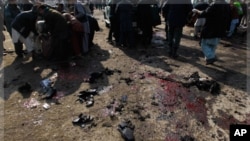Afghan President Hamid Karzai says Tuesday's rare sectarian attacks on minority Shi'ites in the country killed at least 80 people, significantly higher than the previously reported figure of 59.
In a speech Sunday in Kabul, Karzai said he learned of the updated death toll earlier in the day and blamed the bombings on people trying to undermine peace in Afghanistan. In the deadliest December 6 attack, a suicide bomber blew himself up near a Kabul shrine where Shi'ites were marking the holy day of Ashura, while a smaller blast happened near a Shi'ite shrine in the northern city of Mazar-e-Sharif.
Authorities initially put the death toll at 55 in Kabul and four in Mazar-e-Sharif. It was not clear if the 80 deaths reported by Karzai included people killed only at the Kabul shrine or in both cities.
Pakistan-based militant group Lashkar-e-Jhangvi claimed responsibility for the Kabul attack, which raised fears that Afghanistan could see an eruption of Sunni - Shi'ite violence of the kind that is common in Pakistan and Iraq.
U.S. Ambassador to Afghanistan Ryan Crocker said Saturday he does not expect the Ashura bombings to ignite a sectarian conflict, in part because Afghan Shi'ite leaders have called for calm.
Afghanistan's Sunni militant Taliban movement issued another statement Sunday condemning the attacks.
In other violence, NATO says a bomb attack killed two of its service members in eastern Afghanistan on Sunday. It did not disclose their nationalities.
President Karzai also used his speech to urge the international community to do more to help Afghanistan fight corruption. Berlin-based group Transparency International ranked the country as one of the world's most corrupt in a survey released this month.
In his speech marking International Anti-Corruption Day, Karzai said foreign donors and companies contribute to the corruption problem by awarding development contracts to high-ranking Afghan officials and their relatives. He called for the practice to stop.
Speaking at the same event, the head of Afghanistan's High Office of Oversight and Anti-Corruption said his agency is like a "toothless lion" and needs more power to deal with the problem. Azizullah Ludin said Afghanistan's more than 10 anti-corruption bodies should be merged into a single unit to fight corruption effectively.
Karzai also called on the United States to extradite former Afghan central bank chief Abdul Qadir Fitrat to face questions about a corruption scandal at Kabul Bank, Afghanistan's biggest commercial lender. Fitrat fled to the United States in June, saying his life was in danger because of the scandal.
Critics accuse Fitrat and other central bank officials of failing to act on warnings of corruption inside the private bank, whose near-collapse last year triggered an economic crisis.
Some information for this report was provided by AP, AFP and Reuters.




